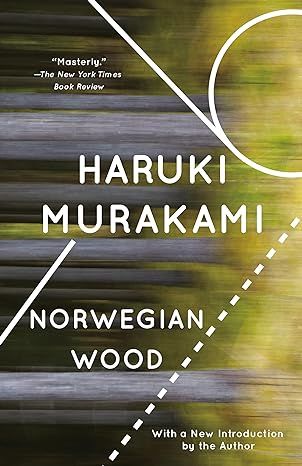
Norwegian Wood
4.4 out of 5
19,007 global ratings
From the bestselling author of Kafka on the Shore: A magnificent coming-of-age story steeped in nostalgia, “a masterly novel” (The New York Times Book Review) blending the music, the mood, and the ethos that were the sixties with a young man’s hopeless and heroic first love.
Now with a new introduction by the author.
Toru, a serious young college student in Tokyo, is devoted to Naoko, a beautiful and introspective young woman, but their mutual passion is marked by the tragic death of their best friend years before. As Naoko retreats further into her own world, Toru finds himself drawn to a fiercely independent and sexually liberated young woman.
Stunning and elegiac, Norwegian Wood first propelled Haruki Murakami into the forefront of the literary scene.
About the authors
Haruki Murakami
Haruki Murakami was born in Kyoto in 1949 and now lives near Tokyo. His work has been translated into more than fifty languages, and the most recent of his many international honors is the Jerusalem Prize, whose previous recipients include J. M. Coetzee, Milan Kundera, and V. S. Naipaul.
Reviews
Kindle Customer
5
I'm crying
Reviewed in the United States on May 18, 2024
Verified Purchase
No you're crying
Even though I have never experienced a loss like the one described in the book, I felt so many emotions like I was right there with Watanabe.
I feel like I'm going to re-read this book and still enjoy it as if I were reading it for the first time. Or maybe Ill re-read it and realize the book wasn't as good as I remembered. I'm 21 years old right now so I feel like I read this book at the perfect stage in my life.
Not really a book review but more of a personal journal type thing.
Read more
Sean Li
5
A meditation on love and loss
Reviewed in the United States on April 24, 2024
Verified Purchase
It feels like a tale that's told over a pot of loose leaf tea as the sun sets. It has a time, and a setting, and a world, and for all of that, it feels timeless; it is a story simply about the paths of individuals, coming together, and coming apart, and coming to an end.
It is a love story told in quotes, a romance that's only ever bitter, a relationship that feels like trying to find one's way through a dark forest wreathed in fog.
Read more
P. J. Owen
5
A coming of age story that you won't be able to put down
Reviewed in the United States on May 8, 2011
Verified Purchase
Murakami is someone I've never fully embraced, yet keep coming back to. I don't like some of the fantastic and surreal elements of his writing, but I'm also drawn by the energy, intelligence, and inventiveness of it. And I also love how he infuses his work with elements of Western culture, especially music.
Norwegian Wood is a straight-on story about love and loss, and coming of age. It's not cluttered by any surrealism or fantasy. And it's loaded with musical references to classical and jazz, as well as the Western rock music of the late sixties. (As the title would suggest.) Thus, Norwegian Wood was exactly the right Murakami book to pick up next, the one book to push me further into his work.
It tells the story of Toru Watanabe, a college freshman living in Tokyo. Like many young men his age, he doesn't know what he wants to do with his life, and majors in drama for no real reason. And like many men his age, women both complicate and clarify things.
He has relationships with two completely different women: the troubled and introspective Naoko and the outgoing and spunky Midori. Naoko poses the most trouble for Toru for many reasons. First, she's the ex-girlfriend of Toru's best friend in high school, Kizuki, who committed suicide at 17. Kizuki's death had a major impact on both friends. For Naoko, she lost not just a boyfriend, but someone she had known since childhood, someone who had become almost a part of herself. For Toru, his friend's suicide changed his perspective on life, filling everything with the taste of death. `Death is not the opposite of life, but a part of it', becomes his new motto.
So when Toru and Naoko meet again, accidentally, on the subway, there's a connection, but a troubled one. The ghost of Kizuki hangs over them. They begin with odd walks through the city, Toru trailing Naoko like a puppy. But eventually a form of love develops. Once things eventually come to a head on her 20th birthday, their relationship becomes further complicated as Naoko runs away to a kind of sanatorium in the mountains over Kyoto. Months pass before Toru even knows where she's gone, and he lives in a sort of limbo, going to school, working at a record store. Waiting.
Meanwhile, he meets Midori, a fellow drama student. They form an immediate bond, though she has a boyfriend and has her own problems with her troubled family life, including a father dying of brain cancer. They become fast friends, and Toru finds himself attracted to her despite the pain he still feels at the loss of Naoko.
Of course, Naoko muddies the waters again by writing him to tell him where she is and inviting him to visit. There he meets Naoko's roommate, Reiko, an older woman with a talent for music. The three spend much time sitting around while Reiko plays guitar for them, including Naoko's favorite song, Norwegian Wood. In a sense, Reiko becomes the third woman in Toru's life, because she is open, and they develop a friendship in his short time there. With Naoko, he learns some more about her issues, but just enough happens to keep him connected to her, not enough to resolve their love. He is still in a limbo.
Murakami teases the frustrations of this state out of Toru. Toru agonizes over his dilemma, stuck between a woman he loves but can't have and a great woman he can have. Midori begins to fall for him and pressures him. But he's waiting for something to happen. Of course, something does. But then what? Has he waited too long?
This is a great story, but it is further strengthened by great characters. Besides Toru and Midori, whose honest, straight-forward manners combine with deep vulnerabilities to make them both irresistible, Murakami fills the landscape with great supporting actors as well. Reiko steals each scene she walks into. Toru's anal roommate "Storm Trooper" makes for some good laughs, and is a great source of conversation for Toru. Nagasawa is a privileged student of an elite university who is drawn to Toru through a shared love of Western literature and uses his influence to help Toru out of a few jams. Yet his arrogance and womanizing also adds a layer of complexity to the friendship, as these traits both compel and repulse Toru. The characters really make this book hard to put down.
Norwegian Wood is a great read and will definitely keep me on the path to reading more Murakami.
Read more
37 people found this helpful
Phred
4
Murakami, not quite coming of age as a writer
Reviewed in the United States on November 10, 2016
Verified Purchase
Bottom Line First: Haruki Murakami’s fifth book, Norwegian Wood was his break out book as a major Japanese novelist. It is not the fantasy reality of his later works. This is a more personal book and more focused on people, moods and feelings. It has serious emotional depth and some wasted space. Were I not coming into this book as a fan, I am not sure I would have determined to read all of his titles. Recommendation a definite read for like minded fans, a bit troublesome for the uninitiated but a good story of a time place and age.
The narrator and central character of Norwegian Wood, Toru Watanabe is a relatively impecunious collage freshman in a lessor Japanese collage. He is socially withdrawn and emotionally uncertain. He was the last person to see his very close childhood friend before the friend committed suicide and through him he has a very close feeling for his late friend’s girlfriend Naoko. They are both survivors of the suicide and both having to understand who they are absent this person who had been their common center.
Much of this 400 page novel is about Watananbe trying to understand who he is and how he best fits into the lager world after leaving home. This world is the Japan of the 1960’s where student can take over the campus and politics as much as money influence your social standing. He is has a powerful bond with Naoko and will become deeply involved with a stronger, elusive female college classmate Midori. Watanabe is alternately a good person, instantly able to, for example, identify with and bond with Midori’s dying father. He is just as capable of using his socially adept and well healed collage chum to cruise the bars to pick up and sleep with random faceless women. He does not like any of his male classmates and he has a particular distaste for the man he uses for a variety of favors.
Most of Norwegian Wood is about how Wanatabe alternately indulges and pushes himself while allowing events and people to flow around him. He is capable of being very gentle and understanding. Or he is being passive and accepting. One expects that he would make a very good psychotherapist, or at least a counselor of some type. For all this the word I kept associating with him was ‘Passive”.
I have to agree with other reviewers who feel this book has been padded out. It may be that in the original, many of the overly detailed descriptive passages are lyrical, but too often I found them a needless demand on my time. Murakami can set a mood and bring you into people’s minds but at this point he is not always sure why he brought you there.
Norwegian Wood s early Murakami. It is not his best. He will keep many themes and backgrounds in later works. I liked this book, even if at times, I wanted Watanabe to take a stand, to take charge and for the writer to speed things up.
Read more
12 people found this helpful
ET
3
Somewhat Disappointing Manga Surrealism
Reviewed in the United States on January 7, 2023
Verified Purchase
I ordered this book to see what the fuss over Murakami was all about, especially among the New York literati. I looked up rankings of Murakami's books and lists of his highest-rated books, and this came out consistently near the top. I'm not sure what I was expecting, perhaps something deeply philosophical and beautifully written. But I learned something very important from this book, and that is that there's a difference between a good story and good literature, and Norwegian Wood is the former but not the latter.
The story underlying Norwegian Wood is fundamentally a good story, but the prose is terrible, and none of the female characters, except for Reiko, are written realistically, and there is too much pornographic detail in the sex scenes compared to the level of detail devoted to the other minutiae of the story's content. Some of those scenes are downright misogynistic.
First, let's talk about the story. Murakami is skillful in setting up situations and moods that are underscored with a feeling of mystery and unpredictability beneath a banal surface, where you sense anything at all can happen for reasons you can't explain but can intuit, rather like in a dream. He also has made a penchant for tackling subjects that perhaps traditional or high Japanese culture has been hesitant to address: mental illness, depression, suicide, LGBTQ issues, female sexuality, nihilism, and apathy toward a typical modern work ethic. Perhaps it's healthy for a society that hasn't addressed these themes to do so. The problem is that these themes are nothing new to the West, which has been addressing them in the arts for at least a century. Perhaps this is why Americans feel so comfortable with Murakami's work.
After a while, though, all the depression and isolation in the book seems fetishized, like a type of pornography of alienation, with no cause other than the desire of the author to savor it. And few viable solutions as well. I mean, don't these depressed, lonely kids have their parents and family and friends to talk to? If Murakami is making a statement about the negative effects of a workaholic culture on its members, I'd be interested to hear more about that. But we don't really. The story has a few good touches, such as when Toru and Midori have lunch in her apartment while detachedly watching an apartment fire from across the street, and when Toru feeds her dying father cucumbers in the hospital. Otherwise, we just kind of watch these kids wander around and get lost.
But let's now talk about the prose. New York reviewers tend to call it "spare" but that's a bit too flattering. It's inarticulate, cliched, and hackneyed. It sounds like it was written by a teenager. You might try to defend the prose since the tale is told from the viewpoint of a teenage college student, but it's NOT told from the viewpoint of a teenage college student. It's told from the viewpoint of a 37-year-old man RECALLING his days as a teenage college student, so the prose SHOULD be richer and more sophisticated, but it's not. The narrator talks like this because Murakami writes like this. And he writes like this because he knows his audiences respond well to simple vocabularies and phrases and that this sells more books. It's just a cheap ploy for a wider audience. I felt like I was reading an article from Cosmopolitan magazine, like I was cheating myself out of a richer reading experience I could have gotten from another book.
Now let's talk about the female characters. Aside from Reiko, none of them seem real, and none of them behave in a way that a woman, or any real human person, would plausibly behave. Naoko is a diaphanous abstraction. Midori is a Manic Pixie Dream Girl. Hatsumi suffers too willingly under Nagasawa. They all seem to exist as vessels for male desires or absorbers of male suffering. Even Reiko, who is the realest and most likeable person in the book, has a backstory that is bizarrely implausible. She, a woman in her 30s, tells of being sexually assaulted by an oversexed, sociopathic, lesbian 13-year-old. When has that type of thing ever happened? When does that ever happen? When and where has such a girl ever existed? Only the in the misogynistic fantasies of male authors, perhaps. That's where. The backstory is so incongruous and unbelievable that it undermines the efforts of the author to have Reiko appear so trustworthy. It really comes across as another revelation of the author's sexual tastes that litter his books and seems to serve no other purpose.
Norwegian Wood gets tiresome sometimes in its descriptions of mundane activities, of eating, drinking, studying, and laundry. It's typically during the sex scenes where the detail begins to blossom into more flowery descriptions, but for no good reason save for perhaps the author's own desires and tastes. After a while, it becomes embarrassingly obvious that Murakami is attracted to underage girls with large breasts and that he likes manual sex, penchants that become even clearer while reading Kafka on the Shore. After a while, I wouldn't have found it surprising if Toru had ended up having sex with his male friends. After all, they're the only ones left he hadn't had sex with by the end of the book.
So lurid is the sex in this book, and so fetishized is the depression, and so flat is its prose that I wouldn't regard this as high literature at all. It comes across as pulp surrealism, or manga surrealism, an interesting tale told in a lowbrow way. Norwegian Wood is really not much more than high-priced pulp fiction. There's not much that's wrong with pulp fiction, either. Just don't pretend that it's high literature while selling it for the very same salacious reasons that pulp appeals to a mass audience. If this is considered Murakami's best book, I'm kind of not looking forward to reading any others. After this and the Kafka book, I'll give him one last try. If I don't feel good after reading the Wind-Up Bird Chronicle, I'm giving up on Murakami altogether and I'm sticking with Hesse, Kafka (the real thing), and Schulz.
Read more
65 people found this helpful
Top Haruki Murakami titles
Best Sellers

The Great Alone: A Novel
4.6
-
152,447
$5.49

The Four Winds
4.6
-
156,242
$9.99

Winter Garden
4.6
-
72,838
$7.37

The Nightingale: A Novel
4.7
-
309,637
$8.61

Steve Jobs
4.7
-
24,596
$1.78

Iron Flame (The Empyrean, 2)
4.6
-
164,732
$14.99

A Court of Thorns and Roses Paperback Box Set (5 books) (A Court of Thorns and Roses, 9)
4.8
-
26,559
$37.99

Pretty Girls: A Novel
4.3
-
88,539
$3.67

The Bad Weather Friend
4.1
-
34,750
$12.78

Pucking Around: A Why Choose Hockey Romance (Jacksonville Rays Hockey)
4.3
-
41,599
$14.84

Start with Why: How Great Leaders Inspire Everyone to Take Action
4.6
-
37,152
$9.99

Tomorrow, and Tomorrow, and Tomorrow: A novel
4.4
-
95,875
$13.99

